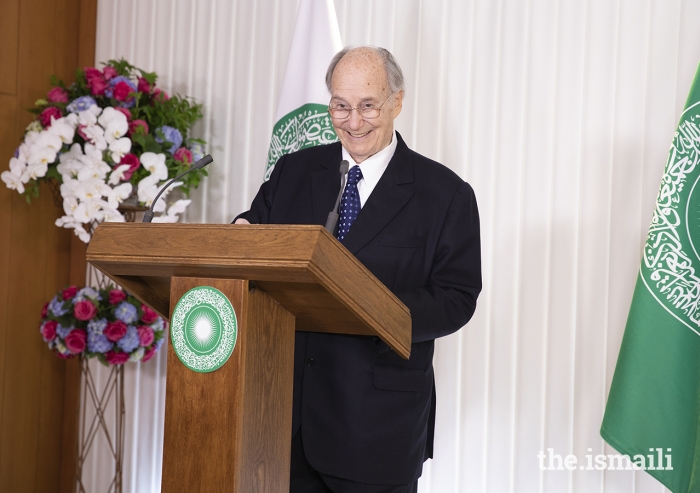Aga Khan Award for Architecture Closing Ceremony, Marrakech
I would like to begin by expressing the Award’s gratitude to His Majesty the King and the Government of Morocco for having welcomed the Award to have its third Prize giving Ceremony here in Marrakech. I would also like to thank most warmly the Cabinet Ministers of the various countries who have done the Award and the profession and the winning projects. The honour of having come from their countries to participate in these ceremonies and to testify thereby their interest in the work that is being done within their own countries to develop a better environment for the people who live there.
I would also wish on this occasion to thank my Master Jury present and absent – all absent for good reason – and the Steering Committee members for having worked for the last three years very intensively on a domain which is difficult to grasp, which is challenging all the time and in which there is nothing absolute.
Maybe on that particular point I could express a few personal opinions. I think that in the Islamic world today, those who live within it and those who care about it, Muslims or otherwise, must be careful not to seek to live within the terminology of the absolute. Muslims do not believe in the absolute other than in God Himself.
I think that this is an important concept to keep in mind. Because, if, as I think many of us believe, it is necessary for us to discover not a culture but our cultures, then any risk of stifling inspiration from any source, from any part of the world, is really a condemnation of the whole process of man’s creativity. I am concerned about this and that is why I think it is something worth mentioning today, after nearly 10 years of work.
This morning’s review of premiated projects, taken altogether, showed a remarkable wealth and breadth of issues that we have tried to deal with in the last 10 years. None of us, I think, and certainly not myself, would say that we have found any perfect answer. We do not believe in perfection in this life, nor do we believe in the absolutism of anything in this life, and therefore we are genuinely in the process of search.
What I hope is that this search, over a period of years, will succeed in re-creating for us nearly a unique inventory of inspiration, of talent, of knowledge, for dealing with issues as they change, because they are not the same from one decade to the other, so that, in the years ahead, the Islamic world is able to draw upon such an extraordinary inventory of creativity design in its physical environment.
I think therefore that the debate of the last 10 years, and the debate which you have all participated in today, has really served to highlight how many different standpoints are legitimate in looking at the issues that we have to deal with, and to me, the question that these starting points might in some way be illegitimate is something which, I think, the Islamic world and certainly the Award have to set aside as being not a part of our process. I think we have to re-commit ourselves to look at all sources of inspiration from all parts of the world so long as their objectives is to serve the purpose of creating a better environment for Muslim peoples around the world, appropriate to their cultures and climates.
I also think therefore, that in my comments today, I simply wish to underline that the freedom to continue to search is perhaps the most important and fundamental value which I hope that you will all stand by and support, because anything which is absolute, I think, would represent, for the future of the Islamic world, nothing less than a horrible prison.
I thank you for having accepted to be here on this occasion and to share with the Steering Committee the concerns that it has been dealing with in the last three years and I hope that you will go home with a sense that the search is not complete but we are beginning to put together a very wide inventory of inspiration, talent, knowledge, which, I hope, we will share with more and more people all around the world, and more and more often in the future.







